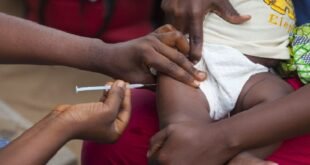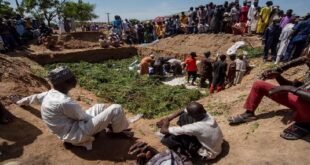30-04-2021
Bureau Report + Agencies
NEW DELHI/ SAO PAULO (BRAZIL): India sets another coronavirus positive tests and deaths record while the Brazil still stands first in pandemic as global COVID data tallies confirmed.
India’s total COVID-19 cases have passed 18 million after another world record number of daily infections, as gravediggers worked around the clock to bury victims and hundreds more were cremated in makeshift pyres in parks and parking lots.
India reported 379,257 new infections and 3,645 new deaths on Thursday, health ministry data showed, the highest number of fatalities in a single day since the start of the pandemic. However, medical experts believe India’s true COVID-19 numbers may be five to 10 times greater than the official tally.
 The world’s second-most populous nation is in deep crisis, with its hospitals and morgues overwhelmed. Each day, thousands of Indians search frantically for hospital beds and life-saving oxygen for sick relatives, using social media apps and personal contacts. Hospital beds that become available, especially in intensive care units (ICUs), are snapped up in minutes.
The world’s second-most populous nation is in deep crisis, with its hospitals and morgues overwhelmed. Each day, thousands of Indians search frantically for hospital beds and life-saving oxygen for sick relatives, using social media apps and personal contacts. Hospital beds that become available, especially in intensive care units (ICUs), are snapped up in minutes.
Al Jazeera’s Elizabeth Puranam, reporting from the capital, New Delhi, said that hospitals in the city are full and they have had to turn away sick patients and their desperate family members.
“Delhi’s leaders say that despite trying their best, every single hospital is operating beyond its capacity. People inside hospitals are sharing beds, some are lying on corridor floors,” Puranam said.
“Delhi’s leaders say they hope to have 1,200 extra intensive care unit beds by May 10, but to put that number into perspective, that is around just five percent of the number of daily infections that Delhi is recording every single day and health experts say around 15 percent of people who are contracting the virus need hospitalization.”
India’s military has begun moving key supplies, such as oxygen, across the nation and will open its healthcare facilities to civilians. Hotels and railway coaches have been converted into critical care facilities to make up for the shortage of hospital beds.
“The central government gave the Delhi government 500 beds in one of their defence hospitals. That filled up in just three hours,” Puranam said.
“The shortage of hospital beds and oxygen is so bad that the US government is the latest to tell its citizens that if they want to leave the country, they should do so now while there are still commercial flights.”
 The US State Department said on Thursday that family members of US government employees in India can voluntarily return to the US.
The US State Department said on Thursday that family members of US government employees in India can voluntarily return to the US.
The department, which approved the move on Wednesday, said in a notice any other US citizens who want to leave the country should use commercial aircraft. It reiterated its warning for US travelers not to go to India.
Aid starts arriving
India expects to receive close to 550 oxygen generating facilities from around the world as medical aid starts pouring in, Foreign Secretary Harsh Vardhan Shringla said on Thursday, adding that 40 countries have pledged their support.
Two planes from Russia have arrived in Delhi, carrying 20 oxygen concentrators, 75 ventilators, 150 bedside monitors, and 22 tones of medicine.
Germany’s air force is preparing to fly medical supplies to India on Saturday, the German defence ministry said. Two A400M cargo aircraft will also transport an oxygen production plant in the coming week.
Bangladesh in a statement also said it will dispatch emergency medicine and equipment including approximately 10,000 vials of injectable anti-viral, oral anti-viral and 30,000 personal protective equipment (PPE) kits.
Taiwan’s Foreign Minister Joseph Wu told reporters the country has bought 150 oxygen concentrators and plans to send them to India this weekend and is also looking at providing further aid.
The White House also said the US is sending supplies worth more than $100m to India to help it fight the surge of COVID cases.
Vaccination drive
Only about nine percent of India’s population of 1.4 billion has received a shot since the vaccination campaign began in January.
A mass vaccination drive due to begin on the weekend is also facing a setback as Indians struggle to register online.
Many who have tried to sign up said they failed, complaining on social media of being unable to get a slot or even to simply get on the website, as it repeatedly crashed.
Meanwhile, millions have voted in the final phase of a marathon election in India’s West Bengal state despite a record-breaking spike in COVID-19 infections and deaths.
 Long queues of voters appeared outside polling booths as many in rural parts of the state failed to observe social distancing rules, with some wearing masks but others hanging them loosely on their chins or from their ears.
Long queues of voters appeared outside polling booths as many in rural parts of the state failed to observe social distancing rules, with some wearing masks but others hanging them loosely on their chins or from their ears.
Packed election rallies attended by mostly mask-less crowds including in the restive eastern state, along with huge religious festivals, have been blamed for India’s surge in cases over the past few weeks.
Furthermore, Nicole Martins had hoped her mother, hospitalized with COVID-19 last month, was on the mend. But when the 24-year-old arrived at the hospital, the look on her father’s face confirmed her worst fears.
The Martins are one of hundreds of thousands of Brazilian families who have lost a loved one to COVID-19 since the coronavirus first began spreading across the country like wildfire.
On Thursday the South American nation surpassed 400,000 coronavirus-related deaths, the second-highest total in the world after the United States. More than half of those were recorded in 2021, while April has been the deadliest month since the start of the pandemic.
Experts blame several factors for the recent uptick, including the more contagious P1 variant, fatigue with restrictive measures such as lockdowns, and slow vaccine rollout.
“With 50 percent of the deaths from COVID happening this year, it shows that the crisis is totally out of control,” Jesem Orellana, an epidemiologist with the Fiocruz medical research institute in the Amazonian capital of Manaus, told media.
Manaus is where the P1 variant was first detected and where in January patients died in their beds asphyxiated due to inadequate oxygen supplies.
Brazil’s far-right populist President Jair Bolsonaro’s response to the crisis, which included downplaying the severity of the disease and casting doubt on masks and vaccines, has been condemned by health experts worldwide.
A Senate commission opened an inquiry this week into the government’s handling of the pandemic.
 “We’ve suffered here a lot with access to information and fake news, like the virus is just a little flu,” said Andre Ferreira, a community leader with Brigada Pela Vida (Life Brigade), an NGO that does COVID-19 outreach in poor communities across Sao Paulo.
“We’ve suffered here a lot with access to information and fake news, like the virus is just a little flu,” said Andre Ferreira, a community leader with Brigada Pela Vida (Life Brigade), an NGO that does COVID-19 outreach in poor communities across Sao Paulo.
Meanwhile, thousands of families continue to suffer each day as their loved ones die.
In Sao Paulo’s low-income Fazenda da Juta neighborhood, where the Martins family lives, more than five people died from the coronavirus on the same street in March, including Martins’ mother.
Thalia Novaes’s 61-year-old father fought for his life for 30 days and was transferred to three different hospitals before he passed away in March. Like many residents, he was buried in the nearby Vila Formosa Cemetery, Latin America’s largest, which has seen queues for people needing to be buried.
“We couldn’t give him the kind of burial we wanted,” Novaes told media. “There were 12 people before us.”
The huge increase in demand led local authorities to set up a generator and lights so that burials could happen at night. It also has taken a physical and mental toll on burial workers.
“It’s hard to see so many people upset,” said James Gomes, a gravedigger for eight years.
Socioeconomic conditions in Brazil, one of the world’s most unequal countries, continue to be a deciding factor in who bears the brunt of coronavirus deaths.
The death rate per 100,000 people in Sao Paulo’s Sapopemba district, where Fazenda da Juta is located, is three times higher than in the city’s trendy Pinheiros neighborhood, according to a study published earlier this year in the International Journal of Epidemiology.
“Of all the ways that a person can work or can study safely, it’s much more difficult for the poor,” said Marcelo Neri, an economist at Brazil’s Getulio Vargas Foundation.
Back in Fazenda da Juta, Martins said her father has struggled to cope since her mother passed away.
Martins still lives below her parents’ home, a common arrangement for many families across Brazil, especially in low-income neighborhoods, and she said she tries to remember better days.
“She used to just call down to me for things she needed, like garlic, something she’d forgotten to get at the shops,” Martins said, about her mother. “I miss those calls now.”
 Pressmediaofindia
Pressmediaofindia




